To most people, they’re movie posters. But to the American film industry and its superfans, they’re one-sheets: posters designed to hang in theaters promoting upcoming releases.
One-sheets are designed to sell tickets. Period. Some one-sheets are beautifully designed. A few border on captial-A Art. But they are all ultimately advertising. Distributors test them in front of focus groups, often resulting in the lowest common denominator of floating movie-star faces and [Trajan, the movie font](http://www.youtube.com/watch?v=t87QKdOJNv8).
One-sheets present the movie that studios hope audiences want to see.
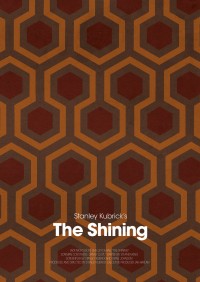
But there is an entirely different class of movie poster that I want to champion. These are posters made *after* the movie by talented fans — in many cases, decades later. They’re not trying to make a movie look appealing. They’re celebrating movies that are already beloved.
Let’s call them unsheets.
I’m not referring to just any fanmade image. You’ll often see posters for movies fans *wish* would get made, like [this one](http://backseatcuddler.com/2008/08/19/new-poster-for-dark-knight-sequel/) for a Riddler-centered Batman sequel. That’s a burgeoning genre I’d call “fantasy one-sheets.”
I would also break out a distinct category of “mock one-sheets,” which range from outright parody to [unlikely mash-up](http://www.flickr.com/photos/hertzen/4725630242/in/set-72157624026063799/). These are the slash-fiction of graphic design. (And that’s meant as a compliment.)
My definition of unsheet has two requirements:
1. It’s for a real movie that has already come out.
2. It has a graphic style atypical for one-sheets of its genre and era.
Most of these are actually virtual posters, in that they’ll never be printed. But that doesn’t mean they won’t be used. Olly Moss’s series for the [2010 Rolling Roadshow](http://trailers.apple.com/trailers/events/rollingroadshow/) reframes nine classic movies with a unified style and color scheme, making a few scattered screenings feel like an event.
Getting the reference
—-
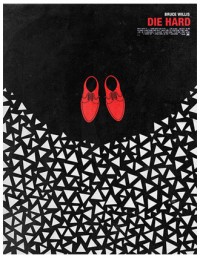
Unsheets often rely on familiarity with the movie. In fact, many of the best unsheets focus on distinct moments or images from the film that serve as a kind of shibboleth: *You’re cool because you get this.*
On their own, these posters might catch your eye and stoke your curiosity, but they don’t tell you anything about the movie. They wouldn’t score well with focus groups.
For example, Ferris Bueller’s Day Off isn’t about a car — at least, it isn’t *mostly* about a car — but its unsheet portrays a key moment that captures much of what you remember about the movie.
This Home Alone unsheet doesn’t tell you anything about the plot or even the genre of the movie. Is it a movie about suicidal housepainters who fall in love? Based on the unsheet, maybe. (But the two cans might have been a good teaser poster for the sequel.)
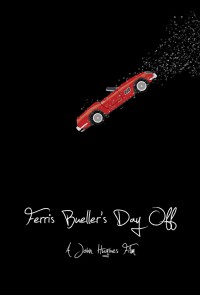
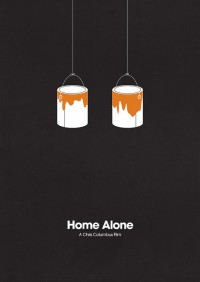
Better than the masses deserve
—-
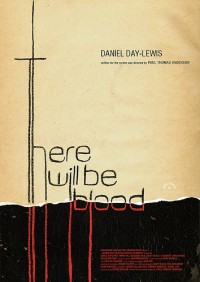
Some unsheets are simply good design. They’re striking in part because they don’t look like traditional one-sheets, using typography and whitespace wholly alien to what we find on video boxes.
You don’t often see photography in unsheets — nor any meaningful representation of the actors. Rather, the star of the movie is the movie itself, or an iconic image from the film.
Some of these could easily be book jackets. For whatever reason, book buyers seem to accept a level of abstraction and design that moviegoers find off-putting. Maybe authors hold more sway over marketing departments. Maybe star designers like Chip Kidd can point to their track record of success. Or maybe, competing with hundreds of titles on the shelf, a striking visual image is the only way of cutting through the clutter.
Many unsheets try to recapture an older graphic style — most notably the work of Saul Bass. But any earlier era is fair game. Narrowing the color palette simulates the real limitations on designers in the time before four-color presses.
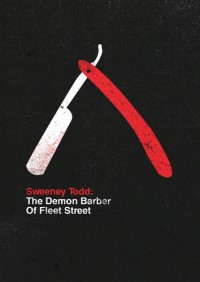
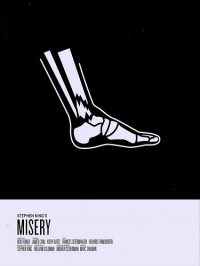
Circling back around
—–
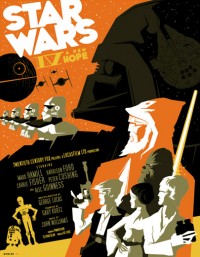
I believe unsheets are already having an effect on traditional one-sheets, particularly movies that can afford to gamble. The [poster for Precious](http://www.firstshowing.net/2009/05/12/fantastic-poster-for-lee-daniels-sundance-hit-precious/) feels like an unsheet, as do the [first](http://www.buzzsugar.com/Picture-Official-Movie-Poster-Buried-Starring-Ryan-Reynolds-8252752) and [second](http://www.firstshowing.net/2010/08/19/new-poster-for-ryan-reynolds-buried-debuts-with-fs-quote/) posters for Buried.
Unsheets have a close cousin in tag-along posters, which highlight some aspect of a movie or series without specifically being *for* that movie.
I’m talking about things like Justin Van Genderen’s [Star Wars travel art](http://www.2046design.com/Star%20Wars2.html), or Tom Whalen’s [Ghostbusters instructional poster](http://strongstuff.tumblr.com/post/960067403/ghostbusters-inspired-technical-poster-created). Like unsheets, they flourish in the cozy embrace of geek nostalgia.
I don’t have any traditional one-sheets hanging in my office, not even for my own movies. But in researching images for this post, I came across a half-dozen unsheets I’d be excited to own.
By stripping away the credit blocks and pithy taglines, unsheets distill films down to their essence — an essence that may not have even been apparent when the movie was released. Studios may own copyright, but fans feel emotional ownership, and these posters reflect that. Ultimately, unsheets aren’t about the movies that came out, but the movies they became.